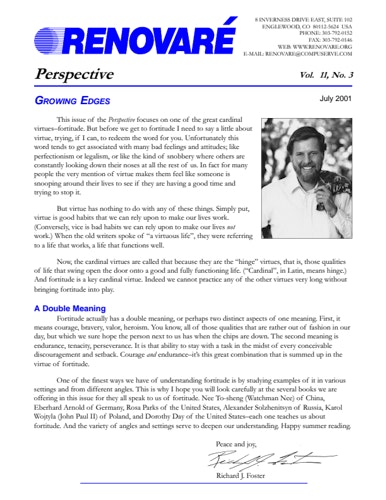A Cardinal Virtue
Let us look together at one of the great cardinal virtues — fortitude. But before we get to fortitude I need to say a little about virtue, trying, if I can, to redeem the word for you.
Unfortunately virtue tends to get associated with many bad feelings and attitudes; like perfectionism or legalism, or like the kind of snobbery where others are constantly looking down their noses at all the rest of us. In fact for many people the very mention of virtue makes them feel like someone is snooping around their lives to see if they are having a good time and trying to stop it.
But virtue has nothing to do with any of these things. Simply put, virtue is good habits that we can rely upon to make our lives work. (Conversely, vice is bad habits we can rely upon to make our lives not work.) When the old writers spoke of “a virtuous life”, they were referring to a life that works, a life that functions well.
Now, the cardinal virtues are called that because they are the “hinge” virtues, that is, those qualities of life that swing open the door onto a good and fully functioning life. (“Cardinal”, in Latin, means hinge.) And fortitude is a key cardinal virtue. Indeed we cannot practice any of the other virtues very long without bringing fortitude into play.
A Double Meaning
Fortitude actually has a double meaning, or perhaps two distinct aspects of one meaning. First, it means courage, bravery, valor, heroism. You know, all of those qualities that are rather out of fashion in our day, but which we sure hope the person next to us has when the chips are down. The second meaning is endurance, tenacity, perseverance. It is that ability to stay with a task in the midst of every conceivable discouragement and setback. Courage and endurance — it’s this great combination that is summed up in the virtue of fortitude.
One of the finest ways we have of understanding fortitude is by studying examples of it in various settings and from different angles, evident in the lives of people such as Nee To-sheng (Watchman Nee) of China, Eberhard Arnold of Germany, Rosa Parks of the United States, Alexander Solzhenitsyn of Russia, Karol Wojtyla (John Paul II) of Poland, and Dorothy Day of the United States. And the variety of angles and settings of their stories serve to deepen our understanding.
Growing Together
How do we practice fortitude? In one sense we don’t, really. It is much more a quality of life than it is particular actions. God is far more interested in people of a particular sort than he is in particular actions. And, in reality, all of the virtues are aimed at developing a certain kind of person, a person who will naturally respond to life’s situations with love and joy and peace and patience and kindness and graciousness and faithfulness and gentleness and self-control.
Having said that, let’s consider a few exercises which can at least help us think about fortitude more.
1. Reflect on an experience in your past where fortitude would have been a great asset to you. Maybe it was a time of real fear or danger. Or perhaps you quit too quickly in a situation where persistence would have brought a better result. Think about that experience “with God”. Maybe confession is needed. Perhaps God can help you to live beyond the regrets of the past. What preparation or life experiences would you have needed in order to respond differently when you were in the situation? What could you be doing now so that the needed resources are yours for when a similar situation arises?
2. Identify one person in your life that best exemplifies fortitude to you. What is it about this person that makes him/her such a sterling example of this virtue for you? Does this person act or behave in a particular way? Is it a special quality of character? Is it that you can almost instinctively trust this person to be there when you need him/her? What is it specifically that you admire? Now, consider how this person came to be this way. What set of circumstances influenced his/her life? What teachings? Was there a particular kind of community or church life that contributed? Are these elements that are missing in your life? If so, are there things you can do to make up for the lack?
3. In certain situations courage and persistence is not exactly the right response. Sometimes we can jump into a situation thinking we are being heroic when we are really being bullheaded and we only make the situation worse. Or we may stick with a project long after we should have abandoned it; we thought we were being persistent when we were only being imprudent. Can you think of a situation like this in your past? Were there any signals which you ignored that, if heeded, would have helped you to see that your actions were misguided? What lessons can you learn from this past experience?
4. We all know that habits are strengthened and deepened through practice. So then, consider what habits of life will incline you more toward courage and endurance. Begin with endurance; it is the easier of the two to think of in terms of habit development. Write out one or two daily practices that would help develop a persistent spirit. A daily routine of serving a neighbor perhaps. Or a regular act that is generally unknown and unappreciated by people at large. Next, consider courage. Try to find an action that helps you to stand up to some daily fear. Or consider standing for a matter of justice in your workplace which will not automatically make you look good. Things like these will help develop patterns of life that will incline us toward fortitude.
5. Fortitude is not a highly sought-after virtue in our day. It is seldom something that will get someone on the evening news. Few today even think about fortitude, not to mention earnestly seek after it. Why is this the case today? Give some energy working on that question. Are there cultural forces which make fortitude less desirable now than in other eras? Are there ways the churches have become a part of the problem? Am I part of the problem?
6. The presence of fortitude (in the double sense of courage and endurance) is essential for the good of any society. Where do you see today’s world leaders exhibiting courage? Where do they exhibit a lack of courage? Is fortitude a political asset or a liability?
7. Fortitude is one of four classic cardinal virtues, the other three being justice, temperance, and prudence. Which of these four is the less familiar to you? Which might be the one you need to work on the most? What plan can you put in place that will substantially increase both your knowledge and experience of these virtues by this time next year?
First published in Perspectives, 2001.
Photo by Pawel Czerwinski on Unsplash
Text First Published July 2001 · Last Featured on Renovare.org September 2022



